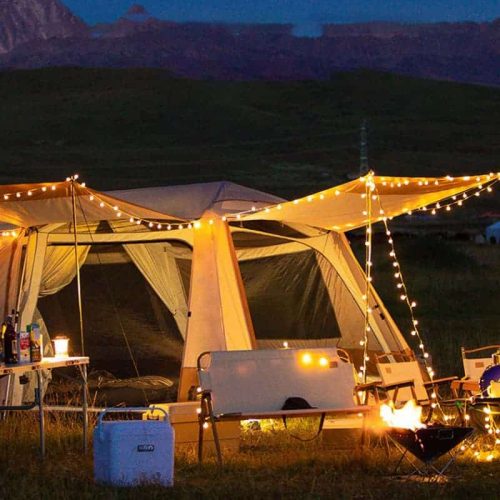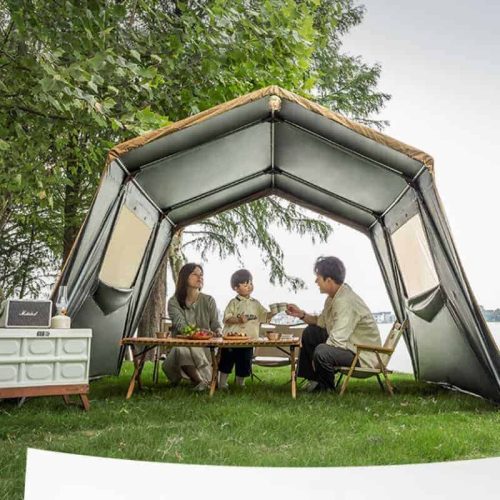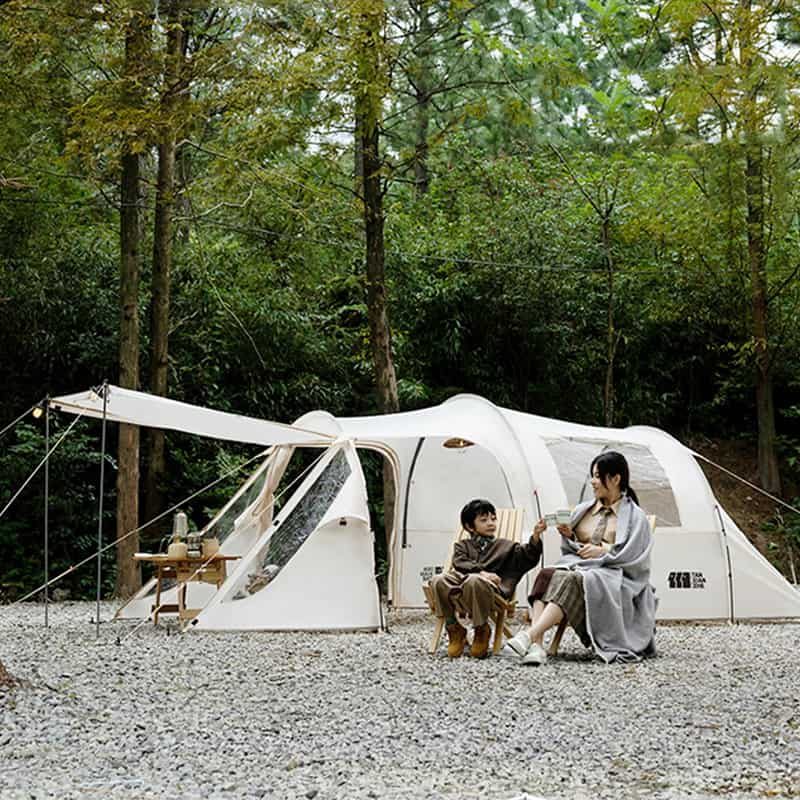Family camping trips offer a wonderful opportunity to connect with loved ones, immerse yourself in nature, and create lasting memories. However, to ensure a comfortable and enjoyable camping experience, it’s crucial to choose a good family tent. The right tent will provide shelter, protection, and a cozy space for your family to relax and bond. In this article, we will guide you through the process of selecting the perfect family tent that meets your specific needs.
Table of Contents

1. Introduction
Camping with your family is an excellent way to escape the hustle and bustle of everyday life. A well-chosen family tent serves as your home away from home, providing a safe and comfortable haven amidst the great outdoors. When searching for the ideal family tent, there are several essential factors to consider.
2.Importance of Choosing a Good Family Tent
Selecting the right family tent is crucial for a successful camping trip. A good tent will not only protect your family from the elements but also offer sufficient space, durability, and convenience. It should be able to withstand various weather conditions and provide ample ventilation to keep everyone comfortable. By investing in a quality family tent, you ensure that your camping adventures are enjoyable, stress-free, and memorable.
3.Factors to Consider When Choosing a Family Tent
Size and Capacity
The size of your family tent is a crucial consideration. Determine the number of occupants and their individual space requirements. Consider whether you need additional space for gear and activities, such as camping chairs or a play area for children.
Tent Design and Structure
Different tent designs serve various purposes. Cabin tents provide ample headroom and vertical space, while dome tents offer better wind resistance. Tunnel tents are versatile and provide separate sleeping areas. Choose a design that suits your family’s needs.
Weather Resistance
Ensure that your chosen tent offers adequate weather resistance. Look for features such as waterproofing, taped seams, and a sturdy rainfly to keep you dry during rain showers. Wind resistance, UV protection, and insulation for cold weather camping are also essential factors to consider.
Durability and Quality
Investing in a durable and high-quality tent ensures that it will last for many camping trips. Check the materials used, including the tent fabric, rainfly material, and floor material. Reinforced stitching and sturdy zippers are also indicators of a well-constructed tent.
Ease of Setup and Portability
Consider the ease of setting up the tent, especially if you’re camping with children. Look for color-coded setup systems, clear instructions, and user-friendly features. Additionally, consider the weight and packed size of the tent for easy transportation.
Ventilation and Airflow
Proper ventilation is crucial for a comfortable camping experience. Look for tents with mesh panels, windows, and adjustable ventilation options to promote airflow and reduce condensation.
Storage Options
Having sufficient storage options within the tent helps keep your camping space organized and clutter-free. Gear lofts, pockets, vestibules, and awnings provide convenient storage solutions for personal belongings, camping equipment, and wet gear.
Price and Budget
Set a budget for your family tent and consider the value for money. Balance your expectations with the features and quality you desire. Remember that investing in a higher-quality tent may provide greater longevity and overall satisfaction.
Understanding Tent Capacity and Space Requirements
Determining the appropriate tent capacity is crucial to ensure everyone has enough space to sleep comfortably. Consider the number of occupants and any additional space requirements for gear or activities. It’s often recommended to choose a tent with a slightly higher capacity than the number of people it needs to accommodate.
4. Types of Family Tents
There are various types of family tents available in the market. Understanding their differences can help you make an informed decision:
Cabin Tents
Cabin tents are known for their vertical walls, providing ample headroom and a spacious interior. They often feature multiple rooms, making them ideal for families who prefer separate sleeping areas.
Dome Tents
Dome tents are popular for their stability and wind resistance. They are easy to set up and usually have a simple yet sturdy structure. Dome tents are suitable for families who prioritize portability and durability.
Tunnel Tents
Tunnel tents are versatile and provide a good balance between space and weight. They offer separate sleeping areas and are known for their ease of setup and packability.
Pop-Up Tents
Pop-up tents are incredibly convenient and can be set up in seconds. They are ideal for families who prioritize quick and hassle-free camping experiences. However, they may lack the durability and space offered by other tent types.
5. Choosing the Right Tent Material
Tent Fabrics
Look for tents made from durable and waterproof materials such as polyester or nylon. These fabrics are often coated with a waterproofing treatment to keep you dry during rain showers.
Rainfly Material
A rainfly is an additional layer that provides extra protection against rain and moisture. Opt for a rainfly made from a waterproof and durable material like polyester or polyurethane-coated nylon.
Floor Material
The tent floor should be sturdy and waterproof to prevent moisture from seeping through. Look for a thick and durable material, such as polyethylene or bathtub-style floors.
6. Weather Resistance and Seasonality
Consider the weather conditions you’ll likely encounter during your camping trips. Your family tent should be able to withstand various weather elements:
Waterproofing and Seam Sealing
Ensure that the tent is properly waterproofed and has sealed seams to prevent water from entering. Look for a high waterproof rating and taped seams for optimal protection.
Wind Resistance
A well-designed tent with sturdy poles and guy lines will offer better resistance against strong winds. Look for features like geodesic or semi-geodesic designs for enhanced stability.
UV Protection
If you’ll be camping in sunny locations, UV protection is crucial. Choose a tent with a high UPF (Ultraviolet Protection Factor) rating to shield your family from harmful sun rays.
Cold Weather and Snow Considerations
For camping in cold weather or snowy conditions, consider a tent with features like a strong frame, snow skirts, and good insulation. Look for double-walled tents with good ventilation to minimize condensation.
7. Tips for Easy Setup and Portability
Efficient setup and portability can significantly impact your camping experience. Here are some tips to consider:
Tent Weight and Size
Choose a tent that strikes a balance between weight and size. Lightweight tents are ideal for backpacking and hiking, while heavier tents offer more durability and comfort for car camping.
Number of People Required for Setup
Consider the number of people needed to set up the tent. Some tents are designed for solo setup, while others require assistance. Having a tent that can be set up by one person can be convenient during family camping trips.
Tent Pole Materials and Design
Tent poles provide structure and stability. Aluminum poles are lightweight and durable, while fiberglass poles are more affordable but slightly heavier. Opt for a pole design that suits your needs, such as freestanding or semi-freestanding.
Color-Coded Setup Systems
Some tents come with color-coded setup systems, making it easier to assemble the tent correctly. This feature can save time and reduce confusion, especially if you’re new to camping.
8. Ventilation and Airflow
Storage Options and OrganizationProper ventilation is essential to minimize condensation and ensure a comfortable camping experience:
Mesh Panels and Windows
Look for tents with mesh panels and windows that provide airflow while keeping insects out. This feature allows fresh air to circulate, reducing the buildup of condensation.
Adjustable Ventilation Options
Tents with adjustable vents or openings offer better control over airflow. They allow you to regulate temperature and airflow according to the weather conditions.

9. Storage Options and Organization
Having sufficient storage options within your tent helps keep your camping space tidy and organized:
Gear Lofts and Pockets
Gear lofts and pockets are convenient for storing small items like flashlights, books, or smartphones. They keep essential items within reach and reduce clutter inside the tent.
Vestibules and Awning
Tents with vestibules or awnings provide extra covered space outside the main sleeping area. These areas are ideal for storing muddy shoes, camping equipment, or creating a shaded sitting area.
Tent Dividers and Room Separation
If you prefer privacy or want to separate different sleeping areas, look for tents with dividers or multiple rooms. This feature allows family members to have their own space while sharing a tent.
10. Budget Considerations
When choosing a family tent, it’s important to find the right balance between quality and price:
Balancing Quality and Price
While it’s tempting to opt for the cheapest tent available, investing in a quality tent ensures durability and performance. Consider your camping frequency and the value a higher-priced tent can offer in terms of longevity and overall satisfaction.
Value for Money
Compare features, materials, and customer reviews to determine the value for money a tent provides. Look for reputable brands that offer a good balance between quality and affordability.
11. Reviews and Recommendations
Before making a final decision, read reviews and seek recommendations from other outdoor enthusiasts. Online forums, camping communities, and expert reviews can provide valuable insights and help you make an informed choice.
12. Conclusion
Choosing a good family tent is essential for a comfortable and enjoyable camping experience. Consider factors like size, tent design, weather resistance, durability, ease of setup, ventilation, storage options, and your budget. By carefully evaluating these aspects, you can find the perfect family tent that meets your specific needs and ensures memorable camping adventures for you and your loved ones.
Frequently Asked Questions (FAQs)
FAQ 1: Can I use a family tent for solo camping?
Absolutely! Family tents can be used for solo camping as well. The extra space can accommodate your gear or provide a more comfortable camping experience. Just ensure that the tent is suitable for your solo needs and easy to set up on your own.
FAQ 2: Are family tents suitable for backpacking?
Family tents are generally designed for car camping or base camping due to their size and weight. If you’re planning a backpacking trip, it’s recommended to choose a lightweight backpacking tent specifically designed for such adventures.
FAQ 3: How long do family tents typically last?
The lifespan of a family tent depends on various factors such as usage, care, and quality. With proper care and maintenance, a good-quality family tent can last for several years of camping trips.
FAQ 4: Can I use a family tent in extreme weather conditions?
While family tents are designed to withstand typical camping conditions, they may not be suitable for extreme weather conditions such as heavy snowfall or strong winds. For such conditions, consider specialized tents designed for extreme weather.
FAQ 5: What is the average cost of a good family tent?
The cost of a family tent can vary depending on size, brand, features, and materials used. On average, a good-quality family tent can range from $200 to $500 or more. It’s important to balance your budget with the desired features and quality to find the best value for money.


